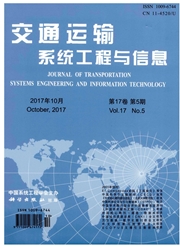

 中文摘要:
中文摘要:
针对"路怒症"诱发的攻击性驾驶行为影响交通安全问题,提出一种基于生理与脑电特征的驾驶人愤怒情绪识别模型.招募15名被试在武汉市区开展限时实车试验.由于所选实验线路为交通繁忙路段,被试易被行人横穿马路、车辆加塞等道路事件诱发愤怒情绪.实验中采用愤怒量表记录被试的愤怒等级,以及采用生物反馈仪与脑电记录仪记录被试的生理和脑电信号.将血容量脉冲、皮肤电导、δ波百分比与β波百分比这四项生理与脑电指标作为模型输入,建立基于置信规则库的愤怒情绪识别模型.验证结果表明,该模型的识别精度(82.24%)较BP神经网络、SVM分别提高7.15%、5.02%.研究结果可为开发基于生理和脑电信号的驾驶情绪识别设备提供理论支持.
 英文摘要:
英文摘要:
As"road rage"easily induces aggressive driving behavior that has negative impact on traffic safety, a recognition model of anger emotion based on driver's physiological and electroencephalogram(EEG) characteristics is proposed in this paper. Fifteen participants were recruited to take part in on-road and timed experiments in Wuhan. Driving anger could be easily induced by specific road events such as jaywalking and weaving vehicles in busy traffic section, which was selected as experiment route. During experiments driver's anger level was recorded by driving anger scale while physiological and EEG signals were recorded by Biography Infiniti System and Neural Scan System respectively. Then a recognition model of driving anger based on belief rule base(BRB) is proposed with four input variables, which included blood volume purse(BVP), skin conductance(SC), percentages of δ wave(δ%) and β wave( β%) in frequency domain. The model's validation results show that its accuracy is 82.24%, increasing 7.15% and 5.02% when compared with BPNN and SVM respectively. The results can provide theoretical support for designing driving emotion recognition equipment based on physiology and EEG.
 同期刊论文项目
同期刊论文项目
 同项目期刊论文
同项目期刊论文
 Identification of common features of vehicle motion under drowsy/distracted driving: A case study in
Identification of common features of vehicle motion under drowsy/distracted driving: A case study in Effect of Circadian Rhythms and Driving Duration on Fatigue Level and Driving Performance of Profess
Effect of Circadian Rhythms and Driving Duration on Fatigue Level and Driving Performance of Profess 期刊信息
期刊信息
